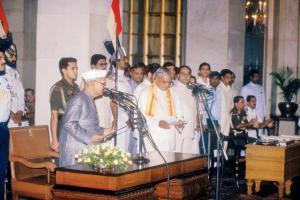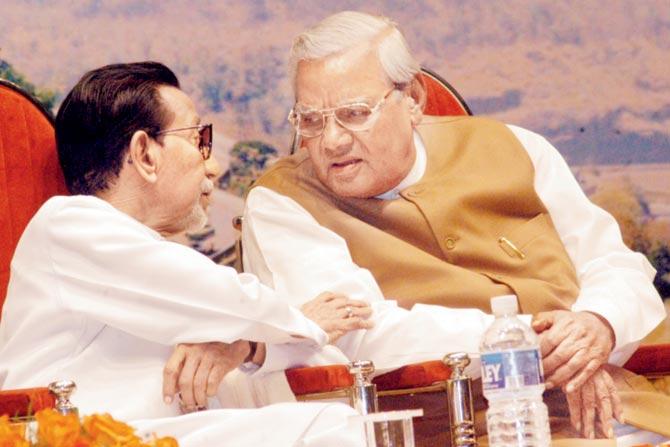The late PM was one of the few right-wing politicians whose powerful persona was the cohesive bond that kept a coalition of differing ideologies together

Atal Bihari Vajpayee (with orange shawl) is sworn in as prime minister for the first time on May 16, 1996, in a stint that lasted just 13 days. Pic/Getty Images
 Atal Bihari Vajpayee will be sorely missed, especially if the BJP gets a fractured mandate in the Lok Sabha elections next year or later this year, if the polls are advanced, and the party needs to put together a coalition of big and small partners. A maverick, Vajpayee was the first non-Congress PM to complete a full tenure in office, thanks to his outstanding chemistry with the parties he worked with. He neither hurt his partners nor deviated from his party's ideology. The partners he had roped in had diversified views and clashing ideologies, yet stuck together to run the NDA government successfully.
Atal Bihari Vajpayee will be sorely missed, especially if the BJP gets a fractured mandate in the Lok Sabha elections next year or later this year, if the polls are advanced, and the party needs to put together a coalition of big and small partners. A maverick, Vajpayee was the first non-Congress PM to complete a full tenure in office, thanks to his outstanding chemistry with the parties he worked with. He neither hurt his partners nor deviated from his party's ideology. The partners he had roped in had diversified views and clashing ideologies, yet stuck together to run the NDA government successfully.
ADVERTISEMENT
The country owes him a lot, though it did not return him to office even in the wake of a first-of-its-kind India Shining campaign. He retired from politics subsequently. Serious illnesses finally claimed his life on August 16.

Atal Bihari Vajpayee shared a cordial relationship with Sena supremo Balasaheb Thackeray
Whatever we enjoy in terms of ultra modern communications technology today, in particular the telecom sector, is only because of Vajpayee's sustained stand that the telecom revolution that the late Rajiv Gandhi had triggered should not cease. Our nuclear programme got a massive push, and every child was given the right to education under his Sarwasiksha Abhiyan.
Vajpayee did not stall any good that previous governments had initiated. He shaped the late Narasimha Rao's economic reforms. Vajpayee is perhaps among the few political leaders whose personal life did not hide any skeletons in the closet. He started as an RSS volunteer and accomplished whatever he was asked to in his early life. Hindutva remained his core belief, but he did not embrace its hardened side for political gain. It was Vajpayee's liberal and love-thy-enemy view that actually gave the BJP a solid foundation in several states. Many in the BJP still say: agar tum na hotey? (What if you hadn't been there?).
The story of the RSS, and its political offshoots — Jan Sangh and BJP — would be incomplete without Vajpayee, who played a hero's role in it with a wider acceptance, even from the Opposition and apolitical statesmen, thinkers and activists.
Although Vajpayee remained loyal to soft Hindutva, he did not shy away from criticising the demolition of Babri Masjid, and later as the PM, disapproved of the bloody riots in Gujarat, following which he had asked the then CM Narendra Modi to follow 'Raj Dharma'. He refused to toe the RSS line whenever he thought it would do the country no good.
Post Vajpayee's retirement, the government-opposition relations changed for the worse. It has been documented how Vajpayee treated the then PM, the late Indira Gandhi, with the highest respect. The late PM had reciprocated in the same degree. She would seek Vajpayee's advice on crucial matters. Parliamentary records show how Indira appreciated Vajpayee for his excellent speeches and even invited him to join the treasury benches, knowing well what his answer would be. Most importantly, Vajpayee never tried to demean any leaders, essentially the founding fathers of the nation, who mostly belonged to the Congress.
He was an orator par excellence, a legend. Every youth in the RSS, Jan Sangh and BJP, even people from other parties, wished they could deliver speeches like him, Maharashtra's current CM Devendra Fadnavis being one of them.
When national television started beaming Parliament's proceedings live, especially the confidence and no-confidence motions, people would be glued to their screens. What separated Vajpayee from other orators was his sensitive side, where his penchant for poetry shone through.
Vajpayee had a special connect with Maharashtra, thanks to Nagpur, and his long association with Gwalior, which had a significant population of Maharashtrian people. He could converse in flawless Marathi (the only other PM who could do that was Narasimha Rao). Naturally, BJP leaders in Maharashtra had a very strong bond with Vajpayee. It was this quality that helped him forge an even stronger bond with Shiv Sena founder, the late Bal Thackeray. The two has many things in common. Old timers recall their mischievous selves, the jokes they cracked and literature they discussed.
Vajpayee shared a special bond with Mumbai as well. It is where the BJP was born in 1980, and Vajpayee assured his party workers of a big win in future. He had said, "Andhera chatega, sooraj niklega, kamal khilega". These lines would send adrenaline coursing through the BJP workers' veins.
It was in April 2005, at Shivaji Park, that Vajpayee declared his retirement from politics. Then a Lok Sabha MP, records say it was his last public speech, in which he handed over the BJP's baton to LK Advani and his protégé Pramod Mahajan, calling them a Ram-Laxman ki Jodi. The selfless and egoless statesman kept the promise when he refused a poll ticket in 2009.
Also read: Former Prime Minister Atal Bihari Vajpayee passes away at 93
Catch up on all the latest Mumbai news, crime news, current affairs, and also a complete guide on Mumbai from food to things to do and events across the city here. Also download the new mid-day Android and iOS apps to get latest updates
 Subscribe today by clicking the link and stay updated with the latest news!" Click here!
Subscribe today by clicking the link and stay updated with the latest news!" Click here!






